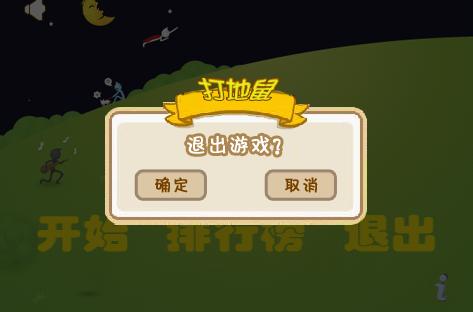有时候我们需要在游戏或应用中用一些符合我们样式的提示框(AlertDialog),以下是我在开发一个小游戏中总结出来的.希望对大家有用.
先上效果图:

下面是用到的背景图或按钮的图片
经过查找资料和参考了一下例子后才知道,要实现这种效果很简单.就是在设置alertDialog的contentView.
以下的代码是写在Activity下的,代码如下:
public boolean onKeyDown(int keyCode, KeyEvent event) { // 如果是返回键,直接返回到桌面 if(keyCode == KeyEvent.KEYCODE_BACK || keyCode == KeyEvent.KEYCODE_HOME){ showExitGameAlert(); } return super.onKeyDown(keyCode, event); } private void showExitGameAlert() { final AlertDialog dlg = new AlertDialog.Builder(this).create(); dlg.show(); Window window = dlg.getWindow(); // *** 主要就是在这里实现这种效果的. // 设置窗口的内容页面,shrew_exit_dialog.xml文件中定义view内容 window.setContentView(R.layout.shrew_exit_dialog); // 为确认按钮添加事件,执行退出应用操作 ImageButton ok = (ImageButton) window.findViewById(R.id.btn_ok); ok.setOnClickListener(new View.OnClickListener() { public void onClick(View v) { exitApp(); // 退出应用... } }); // 关闭alert对话框架 ImageButton cancel = (ImageButton) window.findViewById(R.id.btn_cancel); cancel.setOnClickListener(new View.OnClickListener() { public void onClick(View v) { dlg.cancel(); } }); }以下的是layout文件,定义了对话框中的背景与按钮.点击事件在Activity中添加. 文件名为 : shrew_exit_dialog.xml <"1.0" encoding="utf-8"?> <RelativeLayout xmlns:Android="http://schemas.android.com/apk/res/android" android:layout_height="wrap_content" android:layout_width="wrap_content"> <> <ImageView android:id="@+id/exitGameBackground" android:layout_centerInParent="true" android:layout_height="wrap_content" android:layout_width="wrap_content" android:src="@drawable/bg_exit_game" /> <> <ImageButton android:layout_alignBottom="@+id/exitGameBackground" android:layout_alignLeft="@+id/exitGameBackground" android:layout_marginBottom="30dp" android:layout_marginLeft="35dp" android:id="@+id/btn_ok" android:layout_height="wrap_content" android:layout_width="wrap_content" android:background="@drawable/btn_ok" /> <> <ImageButton android:layout_alignBottom="@+id/exitGameBackground" android:layout_alignRight="@+id/exitGameBackground" android:layout_marginBottom="30dp" android:layout_marginRight="35dp" android:id="@+id/btn_cancel" android:layout_height="wrap_content" android:layout_width="wrap_content" android:background="@drawable/btn_cancel" /> </RelativeLayout>就这样经过了以上几步,就可以实现自定义AlertDialog的效果了. 用同样的思路可以实现其它更复杂的效果.
alertdialog实现确认退出按钮实例代码:
package com.example.alertdialog; import android.os.Bundle; import android.app.Activity; import android.app.AlertDialog; import android.content.DialogInterface; import android.view.Menu; import android.view.View; import android.widget.Toast; public class MainActivity extends Activity { @Override protected void onCreate(Bundle savedInstanceState) { super.onCreate(savedInstanceState); setContentView(R.layout.activity_main); } //名字如果是onBackPressed,那就是按下手机返回键的效果,参数为空即可。 public void onBackPressed1(View v) { new AlertDialog.Builder(this).setTitle("确认退出吗?") .setIcon(android.R.drawable.ic_dialog_info) .setPositiveButton("确定", new DialogInterface.OnClickListener() { @Override public void onClick(DialogInterface dialog, int which) { // 点击“确认”后的操作 MainActivity.this.finish(); } }) .setNegativeButton("返回", new DialogInterface.OnClickListener() { @Override public void onClick(DialogInterface dialog, int which) { // 点击“返回”后的操作,这里不设置没有任何操作 Toast.makeText(MainActivity.this, "你点击了返回键", Toast.LENGTH_LONG).show(); } }).show(); } }


